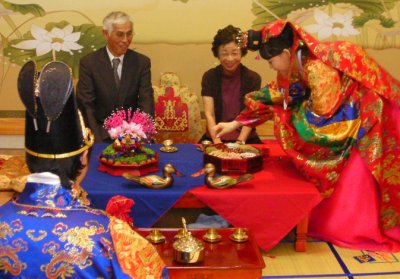It has been ten years since LFNKR (Life Funds for North Korean Refugees) staff members working in China found 10 North Korean orphans who had fled to China to escape the starvation. These first children were the stimulus that prompted LFNKR to begin an education sponsorship program that would enable us to protect them and provide them with an education.
Those ten years have seen these children grow into fine adults. Recently we were pleasantly surprised to receive a wedding invitation from one of our former foster children, Song-hyuk, now 26. His bride is also a North Korean refugee.
With Ms. Watanabe, I headed to Seoul, South Korea to attend the August 23rd wedding. Ms. Watanabe is the wife of Song-hyuk's foster father, who passed away a few years ago.
 Mr. Kato and Ms. Watanabe stand in as parents for the bride and groom, who are both former North Korean orphan refugees.
Mr. Kato and Ms. Watanabe stand in as parents for the bride and groom, who are both former North Korean orphan refugees. |
In 2002, after many hardships, Song-hyuk reached South Korea via Southeast Asia and resettled there. Soon he entered school to work toward his dream of becoming a doctor. But the six years he had spent hiding in China had taken their toll. He soon realized that academically he was far behind other students preparing for entrance exams to medical colleges.
During those years in China, it had been necessary to move often to escape arrest by Chinese police. This constant moving never afforded him an environment where he could focus on studies. He is intelligent, and in fact won third place in a provincial math contest in Jilin Province in China, but gaining entry into a medical college in Seoul was another matter. Only the top three refugee applicants were accepted, and he did not make the final cut.
Following this, he did not despair. Instead, he simply adjusted his goals and changed direction, aiming to enter a college of pharmacy. He continued studying even as he worked a part time job to support himself. After two years, he took this entrance exam, and again missed the mark, scoring below the top seven refugee applicants. This second disappointment meant he would not be attending the college of pharmacy. All of us at LFNKR felt bad for him and wished that we lived closer so that we could be there to encourage him. If he had had family in Seoul, he would have had someone to cheer him on, but we were far away in Japan and could do little to support him emotionally.
In 2007, he gained entry to a vocational school for dental technicians. He is now excited about this career. His grades are very good, and he is doing well. During our visit, he proudly showed us a commendation certificate he received, and told us about the scholarship he was awarded.
Back in 1998, when LFNKR began its activities, those children, including Song-hyuk, were called "Kkot-jebi" (child vagrants, or street kids). They were victims of the widespread starvation caused by a combination of the unwise juche farming method, and a series of natural disasters. At that time, more than 2 million people reportedly starved to death.
LFNKR found those children wondering around the border area of Changbai Prefecture in China near Hoesan, Ryangkang-to in North Korea. They were experiencing extreme hardships after their parents died of starvation. In fact, they stayed constantly on the run to elude the Chinese police and border guards, who had orders to arrest them as "illegal immigrants." Several of the children actually were arrested and sent back to North Korea, but most of these children escaped again into China where they could seek out LFNKR's shelter. However, some of them were too young to remember how to contact us, once they re-entered China, so they never made it back to our shelters.
Back then, they were 10- to 12-year-old kids. Now, they have grown up into strong, self-reliant adults and are living as good citizens in South Korea. At least two of our girls have married and become mothers. Some of them are going to universities, and others are living in the UK.
Before the wedding ceremony began, I was recalling all their hardships and the strength they showed, growing through the hardships and starting entirely new lives in a completely different society.
Since the groom and the bride are both North Korean orphans, no relatives were there to participate in the wedding, but many friends came to honor them and help them celebrate. These included friends from North Korea as well as classmates from the technical school. In the first part of the ceremony, the groom wore a tuxedo and the bride wore a white wedding dress. The second part was a traditional Korean wedding ceremony with a deeply ethnic atmosphere, the groom and the bride wearing the colorful, shining, traditional Korean costumes, as shown in the photo.
A series of ritual greetings were performed. I played the role of the groom's father, while Ms. Watanabe played the role of his mother to accept the couple's formal greeting. I was served a cup of sake and the bride placed a piece of traditional candy in my mouth. I very much enjoyed being included in this wonderful, ethnic and exciting experience!
We extend our best wishes to them for a loving and happy family together!


